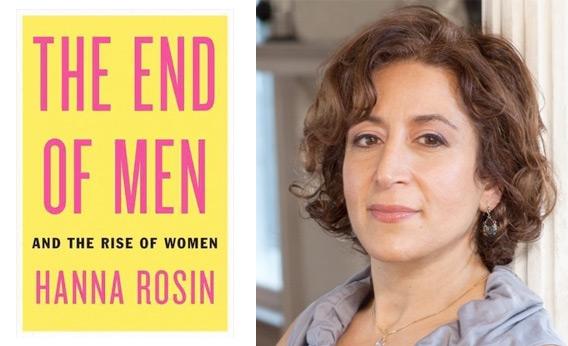Women are set to have more of the money, more of the education and more of the power. Brawn is no longer rewarded: education, empathy and social sensitivity are. It's women, with their adaptability, people skills, intelligence and capacity for hard work who are increasingly earning the money and shaping society in the modern world.

Hanna Rosin believes that the women, like their richer sisters, have discovered a new drive and determination. She says their future looks bright. Of the 30 job categories expected to grow the most in America over the next decade, 20 are dominated by women.
Rosin's thesis is that in these, and in many other ways, women are proving themselves to be marvellously plastic in their response to contemporary challenges, unlike the more rigid, cardboard men. Take sex, for instance. Rosin goes to talk to students at Yale and at an Ivy League business school about how they are managing today's hook-up culture, where between the ages of 18 and 33 no-strings sex is common, men often fail to acknowledge their sexual partners the following day and committed relationships are not the norm.
Rosin sees this change in relations between the sexes as liberation. Feminist progress, she declares, depends on this casual sexual culture. She says women benefit greatly from the freedom of living in a world where they can have sexual adventures "without much shame" and where the important business of getting grades and building careers can happen without the distractions of serious partnerships. She commends women for their sexual malleability and their acceptance of the fact that men are now frequently allergic to monogamy.
It's clear from the conversations she has, and the research she quotes, that women are frequently bruised and hurt by these coarser sexual codes. They go along with it because that's the situation they find themselves in, but they are constantly trying to disguise their vulnerability. Rosin is critical of the fact that men's sexuality is apparently rigid and unchanging. Wherever they live, at whatever time, they would like lots of available women with whom they can have lots of sex. That's pretty much what the hook-up culture delivers for them now, to women's deep discomfort, and yet Rosin sees that as a triumph of women's adaptability.
She reports on the astounding way in which gender roles there are being upended by the fact that as good male jobs vanish abroad, women no longer want to marry them, or even live with them. They don't need another dependent. Lone parenthood is spreading upwards from the poorest classes to the destabilised middle. Marriage is, as one sociologist reports, in danger of becoming a "luxury good" that most Americans won't be able to afford. This is a psychological and financial disaster for men, who are losing their economic and social roles simultaneously.
For the elite- the 30% with college educations - it's a different story. There, women's new status and earning power are making marriages more equal, more financially secure and happier. That's because, on the whole, women are joining men as breadwinners, not replacing them. Some couples take turns at being the highest earner. And although some elite men report feeling demoralised and disoriented at bringing home less than their wives, the crisis they are facing is a private one about relative market worth, not the significant one of being publicly rejected by the market altogether.
The world values female qualities and men must become more like women to succeed in it.


No comments:
Post a Comment
Thank you for your comment. Much appreciated and valued.